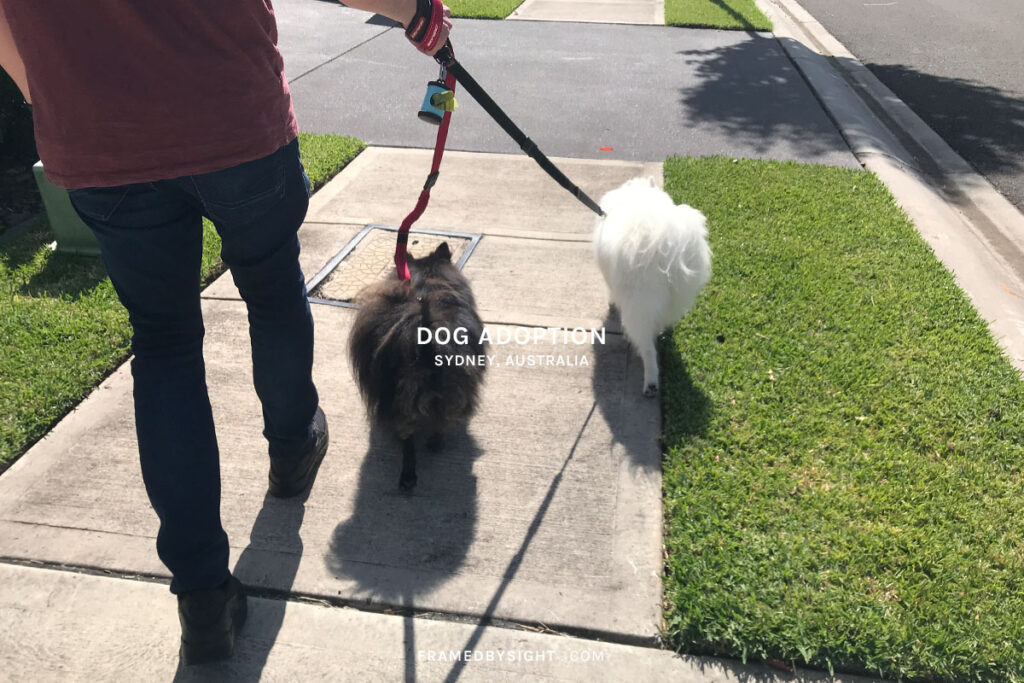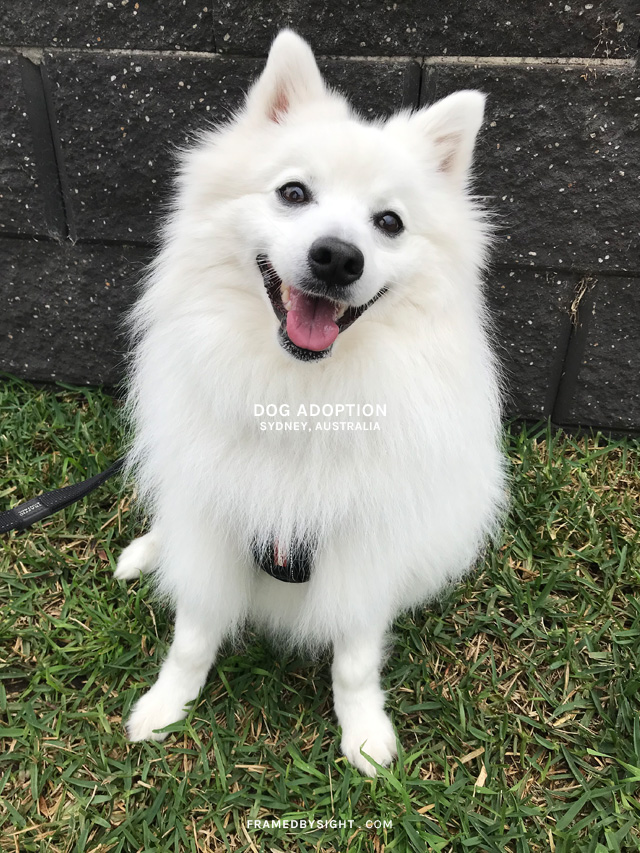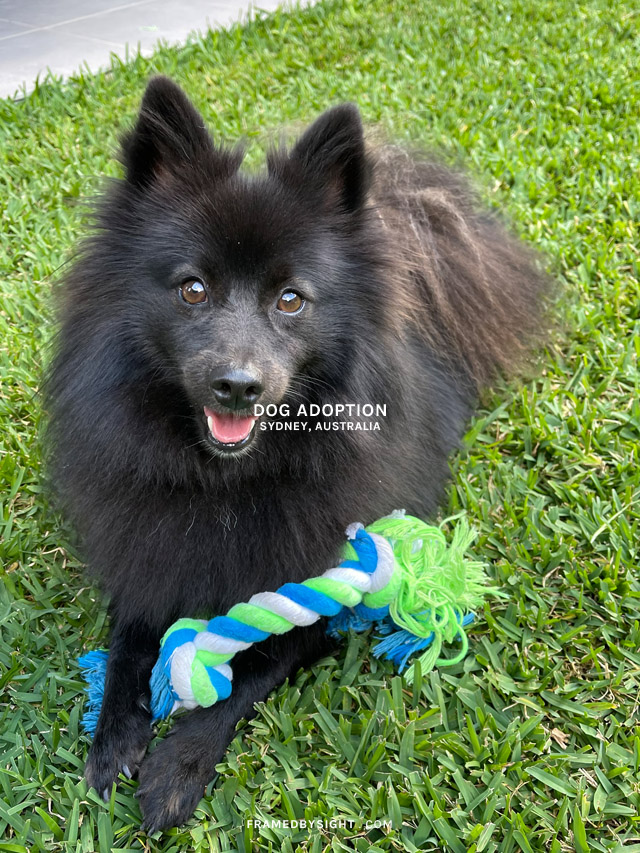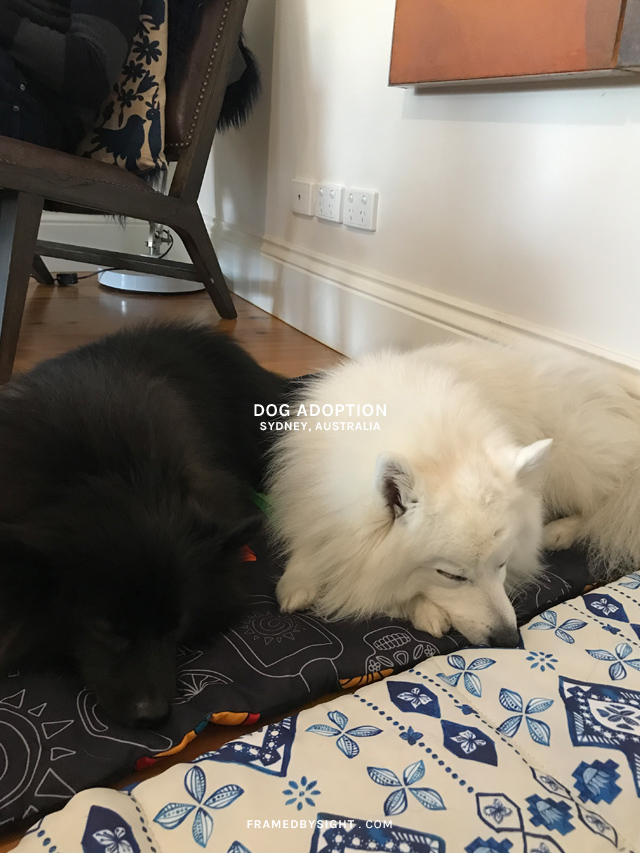Things To Know When Adopting a Dog or Considering Pet Rescues
Thinking about rescuing or a rehoming a dog in Sydney, NSW? In my adulthood years, I’ve never purchased a dog as a new born or puppy – I’ve always chosen to adopt a dog instead. People have different views on what suits their individual needs, and personally, rescuing a dog is what Tim & I have favoured – giving a dog a new lease on life, when other people’s circumstances have changed unexpectedly. Previous owners have their own reasons as to why they give up their dogs, and by doing so, has its pros- and cons- when you become the new owner.

Our first dog was Shiro, a Japanese Spitz who we adopted at the age of four years. He was very social, excellent with commands, and very loyal – the perfect companion dog. Unfortunately, he had a short life in our time, stayed with us for only a handful of years before passing away from cancer.
Our next dog Kenji, also a Japanese Spitz, was re-homed from the age of eight months. This was a completely different experience – other than being toilet trained, we had to teach him everything else. We took him to puppy school, taught him to walk confidently on a lead, had several car rides (as he use to be sick each time he hopped in), and needed to develop a regular routine. He’s still with us today and brings us so much joy.

And most recently, Jörg, a German Spitz, joined our family at the age of two years. Kenji now has a younger brother and actively play together.

Things to consider when adopting, rehoming or rescuing a dog:
- Understand the breed. I cannot emphasise this enough. For example, any Japanese or German Spitz requires regular grooming as they are a double coat breed. If you’re not prepared to brush their coat frequently, they will easily become matted and full of knots, which is painful for any long-haired dog. Your house also becomes full of fur; under the couch, in your clothes, on dark or light objects – and you may need to check that you, or any members of the family are not allergic to the fur itself.
- Effort associated to the breed. The amount of exercise required, and the full-grown size of the breed differs from dog to dog – if you’re looking to rescue a small sized dog vs a large sized dog, do you have the space in your home? And time? Not all dogs suit apartments, and some breeds require hours of exercise every day, with ample yard space to simply play and run in. Socialisation, exercise, training, and providing on-going attention is all part of raising any dog, in addition to the long-term commitment from yourself. Whilst a dog might be ‘cute’ to adopt, the responsibility as an owner is more important to ensure the dog is handled and raised as best as possible, and suits your lifestyle.
- Cost. Adopting from the RSPCA or a rescue group can be affordable as usually the dogs are re-homed already microchipped, vaccinated and de-sexed. However, think about the ongoing costs associated to managing a dog over a 10+ year period. Food, health checks, vet bills, insurance and so on. As dogs age, they can become more expensive to manage due to health in particular. When our first dog passed away, we didn’t have pet insurance, and whilst his cancer was unknown to us at the time we adopted him, we had expensive vet bills following. Fortunately, we were able to manage this, but for some, this may not always be the case and quite costly. Also keep in mind your on-going lifestyle, as it will change over the years – and your dog (depending on the age), should remain with you throughout.
- Age. Their age also impacts the effort required when raising a dog. As a puppy, there are many ‘firsts’ in raising a dog. Imagine setting your alarm every four hours to practice toilet training, or the house destruction that occurs from dogs that are bored – yes, that includes digging holes in the garden, chewing cables, furniture, door mats or rugs (Kenji chewed the corners of two mats before we stopped replacing them). And even destroying dog toys – when they tear them apart unexpectedly. This all happens. The upside of puppies is that you can still train them, or potentially train bad habits out of them. However, older dogs can be set in their ways, have separation anxiety, require another dog for company, be afraid of playful children etc.
These are some of the things that are not always identified in the adopting or rescuing process when rehoming a dog. When considering to have more than one dog, imagine all of the above multiplied, plus the new personalities and dynamics coming together – there will be an adjustment period.
For dogs that are chosen from the pound, it’s usually first in best dressed, regardless of the breed, and you’ll find their initial purchase price is affordable. And their day-to-day behaviour is not always known.
However, through the rescue or rehoming process, some organisations focus on finding the ‘right’ home or new family, before being able to adopt a respective dog. We’ve found those offering adoption through the local breed clubs or rescue centres, tend to focus on the right family. Their temperaments are explained better, and the real reasons for adoption are made known – health conditions, known trauma/s or dislikes, and potentially their most recent life experiences too.
You can also find dogs for sale on the likes of Gumtree and the Trading Post, but be wary of these sellers. Some sellers do have genuine concern for their pets and have no other means but to list their pets for sale in these channels, whilst you may also find backyard breeders. Ask for pure breed papers, and check if the sellers are properly registered. The breed lineage and the process to ensure purity in the breed, is important for future health imperfections.

I cannot equate the amount of unconditional love that our boys bring to our lives. It took us just under six-months when we found Jörg to be the right match for Kenji. We met another dog prior, but unfortunately, Kenji did not get along with the other pooch, that we had to decline rehoming him.
Make sure you put the dog’s best interest at heart – if you’re patient, the right one will come along, and you’ll know if the bond is there for both you as the prospective new parents, and if there’s already another fur-baby in the mix too.